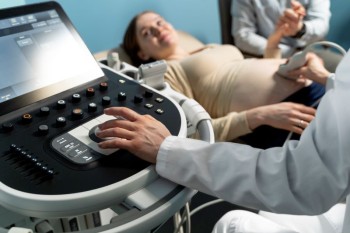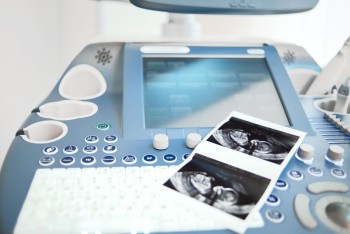
The USG Fetal Echo, a specialized ultrasound examination, focuses specifically on the detailed imaging of the fetal heart.
Ultrasound / USG Fetal Echo in India with Cost
Ultrasound or USG Fetal
Echo in Detail: Nurturing the Precious Heartbeat
Embarking on the journey of pregnancy, the Ultrasound or USG (Ultrasonography) Fetal Echo emerges as a specialized diagnostic procedure, dedicated to assessing the intricate details of the fetal heart. This comprehensive guide aims to unveil the significance, procedure, and invaluable insights provided by the USG Fetal Echo during the course of pregnancy.
Introduction
The USG Fetal Echo, a specialized ultrasound examination, focuses specifically on the detailed imaging of the fetal heart. It plays a pivotal role in evaluating the structure and function of the developing heart, ensuring comprehensive care for both the unborn child and expectant parents.
Understanding USG Fetal
Echo
This ultrasound procedure is tailored to capture real-time images of the fetal heart, providing healthcare providers with crucial information about its structure, function, and potential abnormalities. The USG Fetal Echo is typically performed during the second trimester, between 18 to 24 weeks of pregnancy.
Importance in Prenatal Care
The significance of the USG Fetal Echo lies in its ability to detect congenital heart abnormalities and assess the overall health of the fetal cardiovascular system. Early identification of cardiac issues allows for timely intervention, paving the way for specialized care plans and medical interventions.
Preparation for the Scan
Preparation for a USG Fetal Echo is generally minimal. Pregnant individuals may be advised to wear comfortable clothing, and it is often recommended to have a full bladder to enhance imaging clarity. The focus is on creating a conducive environment for obtaining detailed images of the fetal heart.
Procedure: Capturing the
Rhythm of Life
Gel Application: A clear gel is applied to the abdominal area to
facilitate sound wave transmission.
Transducer Movements: The transducer,
a handheld device, is gently moved over the abdominal skin, emitting sound
waves that create detailed images of the fetal heart.
Fetal Heart Assessment: The procedure
involves a comprehensive examination of the fetal heart, evaluating its
chambers, valves, and blood flow patterns.
Assessment Areas in
Fetal Echo
The USG Fetal Echo provides a detailed assessment of various aspects of the fetal heart, including:
Chamber Structure: Examining the
size and structure of the heart's chambers.
Valve Function: Assessing the opening and closing
of heart valves.
Blood Flow: Evaluating blood flow patterns and
detecting abnormalities.
Cardiac Anatomy: Identifying any structural
anomalies or congenital heart defects.
Benefits of USG Fetal
Echo
Early Detection: Enables early identification of congenital heart
abnormalities.
Specialized Care Planning: Facilitates the
development of tailored care plans for babies with cardiac concerns.
Maternal Reassurance: Provides
expectant parents with valuable insights into the health of the fetal heart,
offering reassurance and guidance.
Risks and Considerations
The USG Fetal Echo is considered a safe procedure with minimal risks. Its benefits in detecting potential cardiac issues in the fetus often outweigh any minimal risks associated with the ultrasound.
Clinical Applications
The USG Fetal Echo is instrumental in diagnosing various cardiac conditions, including:
Structural Heart Defects: Identifying
anomalies in the heart's structure.
Heart Valve Abnormalities: Assessing the
function of heart valves.
Blood Flow Issues: Detecting
abnormalities in blood circulation within the fetal heart.
Expert Perspectives
Cardiologists and maternal-fetal medicine specialists emphasize the importance of the USG Fetal Echo in providing early and detailed insights into fetal cardiac health. Their expertise contributes to informed decision-making and support for expectant parents.
Technological Advancements
Ongoing advancements in ultrasound technology enhance the precision and clarity of the USG Fetal Echo, allowing for more detailed and nuanced imaging of the fetal heart.
Patient Experience
The USG Fetal Echo is generally a well-tolerated procedure by expectant parents. While the focus is on assessing the fetal heart, the procedure contributes to the overall emotional connection between parents and their unborn child.
Conclusion
In conclusion, the Ultrasound or USG Fetal Echo stands as a specialized and invaluable tool in prenatal care, focusing on the intricate details of the fetal heart. Its role in early detection and assessment of congenital heart abnormalities ensures comprehensive care for both the developing baby and expectant parents.
FAQs - Ultrasound or USG Fetal Echo
Q: Is the USG Fetal Echo a routine part of prenatal care?
A: No, the USG Fetal Echo is typically recommended when there are specific risk factors or concerns about the fetal heart. It is not a routine part of standard prenatal care but becomes crucial in certain situations.
Q: Can the USG Fetal Echo diagnose all types of heart abnormalities in the fetus?
A: While the USG Fetal Echo is highly effective, it may not detect every type of heart abnormality. Some complex issues might require additional tests or specialized imaging techniques.
Q: At what stage of pregnancy is the USG Fetal Echo usually performed?
A: The USG Fetal Echo is typically conducted between 18 to 24 weeks of pregnancy, allowing for a comprehensive assessment of the fetal heart's structure and function during the second trimester.
Q: How long does the USG Fetal Echo procedure take?
A: The duration of the procedure varies but generally takes around 30 to 60 minutes. The time may vary based on the complexity of the assessment and the cooperation of the fetus during the scan.
Q: Are there any risks associated with the USG Fetal Echo for the fetus or the pregnant individual?
A: The procedure is considered safe, with minimal risks. Ultrasound uses sound waves and does not involve ionizing radiation, making it a low-risk diagnostic tool. However, any concerns should be discussed with the healthcare provider.
Q: Can the USG Fetal Echo determine the gender of the baby?
A: While the primary purpose of the USG Fetal Echo is to assess the fetal heart, it may incidentally reveal the baby's gender. However, gender determination is not the primary focus of this specialized ultrasound.
Q: Will abnormalities detected during the USG Fetal Echo always require intervention or treatment?
A: Not necessarily. Some abnormalities may resolve on their own, while others may require monitoring or medical intervention. The healthcare team will discuss the findings and potential treatment options with the parents.
Q: How does the USG Fetal Echo contribute to the overall prenatal care plan?
A: The USG Fetal Echo provides valuable information about the fetal heart, allowing for early detection of cardiac abnormalities. This information helps in formulating a comprehensive care plan tailored to the specific needs of the developing baby.
Q: Is the USG Fetal Echo covered by insurance, and is it an expensive procedure?
A: Coverage varies among insurance plans, and it's advisable to check with the provider. While it is a specialized procedure, its cost can be influenced by factors such as location, healthcare facility, and individual insurance coverage.
Q: Can the USG Fetal Echo be performed if the pregnant individual has a higher BMI?
A: Yes, the USG Fetal Echo can be performed on individuals with a higher BMI. However, the effectiveness of the procedure may be influenced by factors such as maternal body habitus, and the healthcare provider will take these into consideration during the scan.
(0)
Login to continue



